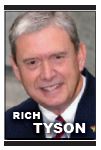By Richard Tyson
Recently, my company, CEObuilder, ran a survey of CEOs, assessing where these leaders experience their greatest challenges, or “pain points.” While we continue to collect data in this regard, early feedback indicates that most CEOs feel a high degree of personal stress. Data further suggests that this is most often a function of an endless to-do list they never fully accomplish and an inability to be clear on where to focus their attention. This latter item is often exacerbated by having “too many strategic options” regarding how to grow their businesses successfully.
Over my years in coaching CEOs, I have found three ways to help clients deal with these issues:
1. Clarifying Your 50,000-Foot View of the Enterprise
Acclaimed business guru and author Stephen R. Covey gave us two very notable quotes in this regard. He said, “Start with the end in mind” and “The main thing is to keep the main thing the main thing.”
In other words, as you view your business from the lofty perspective of CEO, what is your purpose — your why? What is your mission and what are the values you and your team live by to accomplish that mission?
Having a clear idea where you are going is the first step to reducing the stress and burnout that comes from trying to do everything. It will help you know what things to say “yes” to and when to say “no.” Whack-a-Mole may be a fun arcade game, but it’s one that destroys leaders.
2. Defining Your Octopus, then Pruning his Legs
Business — and life — have a way of adding new “stuff” to our to-do lists. Inevitably, as 2020 unfolds, you’ll find what you had planned will require edits and additions. They are a regular occurrence and it rarely works to ignore them. Instead, on a weekly basis, I take about an hour to create an “octopus mind map” of everything I need (or have been asked) to do.
Octopus is not quite descriptive; these mind maps generally have many more than eight legs. They include everything that I might consider in four categories: work, family, service and personal.
Once my octopus is done, I start pruning his legs. This is a prioritization process. I try to follow the counsel Winston Churchill gave during his daunting leadership challenges during World War II. He said, “Work on the two or three most important things at the moment.”
In these words, Churchill acknowledges that there are many things to accomplish, but even for his incredible mind, he couldn’t focus on more than two or three of them. Other critical items don’t go away, but they must be effectively pruned from the actions he would take on any given day.
In the course of my week, I treat myself to the recognition that I am accomplishing important tasks by physically checking these off my mind map. This is psychologically rewarding —and stress-reducing. I’m making progress!
Then, when planning the upcoming week, items temporarily pruned in the prior week re-emerge as legs on the next octopus. Don’t let this re-emergence stress you; just prune down to the two or three most important items. Then follow another of Churchill’s admonitions: “Action this day!”
3. Setting Boundaries Between Your Work and the Rest of Your Life
Psychologist Guy Winch observes that much of CEO stress and burnout comes from what he calls “ruminating about your job.” He suggests that many of us don’t ever unwind from our work, that we are mentally in the office 24/7. He goes on to observe that, with the ubiquitous nature of our smart devices, this is truer today than ever before. When we leave work, we keep the smartphone with us continually. Many of us sleep with it on the bedstand.
Winch suggests three simple techniques to help us truly relax and recharge after work:
• Define when you will switch off your work. Shut off your email, texts and other electronic communication. Create a psychological barrier between work and your non-work life.
• Create a defined work zone at home. When you are working, go there, then make a firm commitment to avoid work in your non-work zones.
• Change out of your work clothes and create a comfortable non-work space to enjoy personal or family time.
Winch asserts that these techniques, when religiously followed, will reduce your stress, improve the quality of your life, and increase your productivity and satisfaction at work.
Richard Tyson is the founder, principal owner and president of CEObuilder, which provides forums for consulting and coaching to executives in small businesses.








